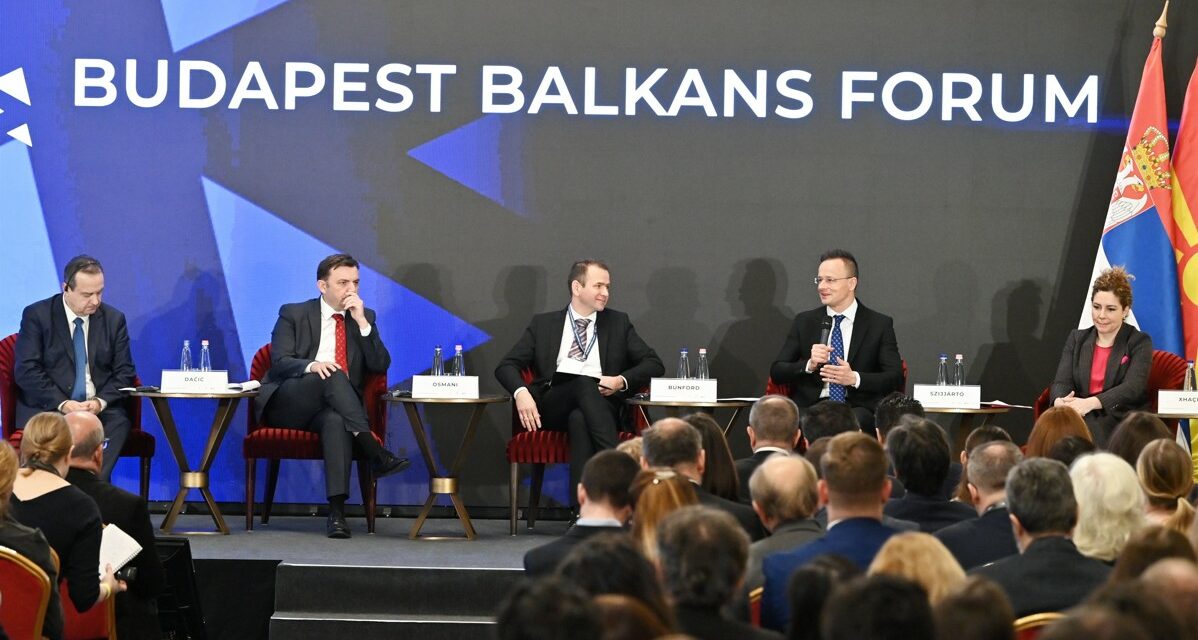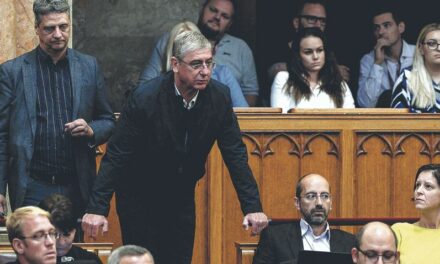The European Union currently needs the Western Balkans more than the states in the region need the community, and accelerating the enlargement process is a matter of national security for Hungary, according to the ministry's information, Minister of Foreign Affairs and Trade Péter Szijjártó said.
The European Union is in increasingly worse shape
At a panel discussion organized within the framework of the Budapest Balkans Forum, the head of the ministry believed that the European Union is in increasingly worse shape, which has many different reasons, one of which is the failure of the enlargement process. In his speech, he pointed out that the last time Croatia joined was about ten years ago, and since 1973 this is the longest time that has passed without a new country joining, and in addition, the community also lost one of its members with the departure of the United Kingdom.
"The more we are, the stronger we are. And the fewer we are, the weaker we are"
- he stated, complaining that despite this, the supporters of the rapid expansion process are not in the majority within the bloc. He underlined:
whoever is against the enlargement weakens the European Union, moreover, many countries are acting hypocritically, as in the presence of the candidate members, in front of the public, everyone speaks in support, but at the same time they put all kinds of obstacles in front of the process, which is completely unacceptable.
Péter Szijjártó emphasized that the EU currently needs the Western Balkans more than the states of the region need the community.
He also mentioned that
For Hungary, the acceleration of expansion is directly a matter of national security,
since the international community has so far not been able to deal with the root causes of illegal immigration, there is a great danger of further waves of migration, and without the effective cooperation of the Western Balkans, Europe cannot cope with the growing pressure.
"If the Western Balkan countries do not cooperate with us in stopping the flow of migrants, we will be in a very difficult situation," he said.
He also stated that
there are no real legal obstacles to speeding up the enlargement process, it is simply a matter of lack of political will. Therefore, as he pointed out, Central Europe must constantly exert pressure in order to demolish artificial dams.
The minister also touched on the topic of the war in Ukraine and warned of the danger of escalation, underlining that it would start in the immediate neighborhood, not hundreds or thousands of kilometers away, and this must be avoided in any case.
The only way to do this and save human lives is to create peace as soon as possible, but when government representatives talk about the importance of this, they are immediately called "Russian spies" or "Kremlin propagandists" in Europe, he stated.
Transatlantic pressure is misleading
He emphasized: the transatlantic pressure is misleading, because the peace rhetoric is much stronger once you get out of this bubble, the majority of the world's countries are in favor of a diplomatic settlement, and hopefully, as a result, it will be possible to bring the ceasefire under the roof and start the peace negotiations as soon as possible. He also pointed out that the war in Ukraine could be another reason to speed up the EU enlargement process. "The European Union must gather strength now, because the war is weakening us, and we can do this through enlargement," he said.
Strategic thinking has been lacking on the part of the EU for a long time
Olta Xhacka thanked Hungary for its solid support of the enlargement process and excellent partnership, and he believed that the EU has been lacking strategic thinking regarding the Western Balkans for a long time, which is quite problematic.
However, he called it good news that since the occupation of Ukraine by Russia, the EU is beginning to wake up and realize the importance of the region, so hopefully an authentic integration perspective will soon be born, after the situation has now become highly politicized and the actors have become hostages of various historical questions too.
As he said, the war provides an opportunity for the EU to update its assessment of the situation and finally realize that the security of Europe cannot be separated from the security of the Western Balkans.
"Unfortunately, it took a war for the European Union to come to its senses"
he said. The North Macedonian Foreign Minister Bujar Osmani spoke about how his country started the path of integration in 2001, but since then it has been stumbling almost in the same place.
The Western Balkans is a kind of island surrounded by EU member states, smaller than Romania, with a population of only 15 million and an economic performance of roughly one percent of the community's gross domestic product (GDP), he said. According to his words, the region is thus "not even the backyard, but the porch" of the EU, and until the states of the region are accepted, there will be a gaping hole in the community, and the project will not be completed.
He pointed out that the Western Balkan region has come an extremely long way from the war trenches to the efforts aimed at building a common regional market, and the main driving force behind this has always been the hope of EU integration, which helped in the resolution of contradictions and reforms.
“That power depends on authenticity. As credibility weakens, so does this kind of driving force"
- he informed, and added that the consequences of this can also be seen in the exacerbation of regional tensions.
In the end, he said that the European Union can trust the commitment of the countries involved, even though they are sometimes frustrated by the slowness of the process.
It's like signing napkins
Ivica Dacic , the head of Serbian diplomacy, expressed his regret that, in his opinion, the EU accession conditions are constantly changing, so it is a kind of "moving target". He reminded, among other things, that North Macedonia even changed the name of the state in accordance with expectations, and yet no significant progress has been made since then.
Nothing follows from the signing of the various conventions, it's like signing napkins, he said, casting doubt on the credibility and trustworthiness of the European Union. Furthermore, he asked the question whether there would really be any problems in the region in order for them to become interesting enough for the EU.
Cover photo: Serbian Foreign Minister Ivica Dacic, North Macedonian Foreign Minister Bujar Osmani, Deputy State Secretary for Security Policy János Zsolt Bunford, moderator of the discussion, Péter Szijjártó Minister of Foreign Affairs and Trade and Albanian Minister of European Affairs and Foreign Affairs Olta Xhacka (bj) at a panel discussion organized as part of the Budapest Balkans Forum at the Corinthia Hotel in Budapest on March 9, 2023. MTI/Noémi Bruzák












